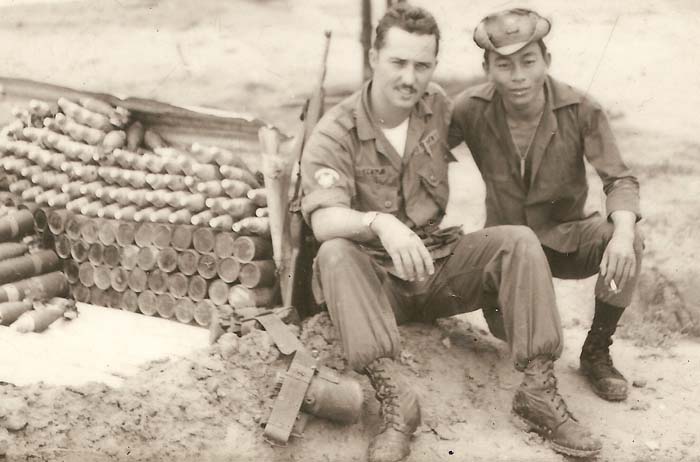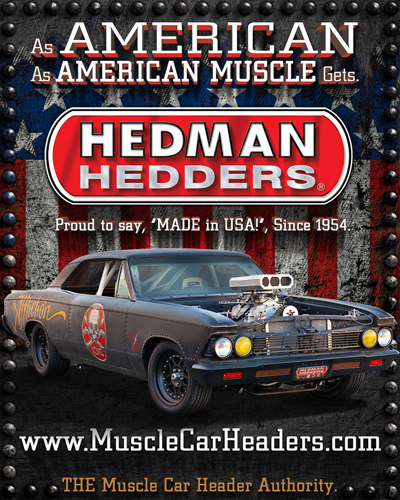MEMORIAL DAY ENCORE - JERRY ECKMAN: EVERY DAY SHOULD BE MEMORIAL DAY

Originally published May 2009
Jerry Eckman is willing to wager most of his racing friends have no idea he’s a Vietnam veteran. The former Pro Stock driver doesn’t talk about the days in a Southeast Asia jungle a lot, but if someone asks, he’s willing to share the experience.
He’s decided to open this chapter of his life to the readers of CompetitionPlus.com, a time in his life he characterizes as both painful and rewarding. The pain came in seeing numerous kids both American and South Vietnamese lose their lives fighting for their countries.
Eckman joined the U.S. Army upon graduation in 1960. He was assigned to the 7th Army division in Germany where he spent the next four and a half years.
“I was having the time of my life, a young man running all over Europe and having a good time,” said Eckman. “My enlistment was up after three years but I wanted to stay a little longer to see more of Europe. When my time in Europe was completed, I came back to the States.”
Little did Eckman know his next military assignment would change his life forever. At the time, U.S. involvement was beginning to ramp up in a conflict in Southeast Asia.
“They sent me to the Dugway Proving Grounds (Salt Lake City, Utah) for special training,” Eckman recalled. “I was there for a few months and then they shipped me to Saigon.”
Eckman believed he was part of an important mission when Commander Gen. William Westmoreland met his group at the airfield. He was classified as a MACV advisor to the Southern Vietnamese Army, Army of Republic Vietnam [ARVN].
“We were sent up in the northern part of the country as advisors where we drew their weapons and supplies,” Eckman said. “Basically, were in the jungle with the South Vietnamese with their World War II weapons.”
One aspect of his assignment Eckman learned quickly wasn’t what he had pictured.
“I heard the term advisor and I believed it was a job where you wore a business suit and carried a briefcase,” Eckman admitted. “I learned quickly there was one of us assigned to so many of the ARVN troops. We were advising them, showing them how to fight their war. We were right there with our combat suits and guns. We didn’t have those suits and briefcases like I envisioned.”
Eckman, by then an E-5 sergeant, quickly developed a bond with his “students” and incoming American troops, who referred to him as the “old” man at 23 years old.
“I felt really sorry for the young kids coming over to Vietnam, who were from the small towns and had never been out of the hometown before,” Eckman said. “Some of those kids believed they knew everything - big mistake. I at least had four years in the military before then.”
Eckman believed he had an obligation to protect these young teenagers as well as the domestic soldiers from harm, or at least educate them on how to fend for themselves. The biggest obstacle, in his estimation, was keeping the kids from becoming complacent in their early participation or when they became “short”, a term used to describe soldiers with weeks left in their tour.
“I think one of the reasons I survived, and I realize I was jumpy and spooked easily when I got home but I refused to allow that to take over my life,” Eckman said. “I think the young guys who came in, who looked up to me as the old man of the outfit, kind of helped me as well because I looked out for them.”
And just as quickly as Eckman speaks in a strong determined voice, his emotions take a 180-degree turn and his voice cracks, eyes welling with tears.
“It’s hard to talk about,” Eckman sobbed.
Then he excused himself, sharing some of his frightening moments of taking enemy fire and losing members of his group as a result.
“I felt like serving my country was a privilege and certainly a duty,” Eckman continued. “We all ended up there because we signed up for selective service right out of high school. If we joined instead of being drafted, we had some pull where we went. That’s why I ended up in Europe. But when we were called to Vietnam we didn’t hesitate, we went.
“You know, in thinking back, we got $55 a month in combat pay, that’s not even $2 a day by current standards. But we thought it was a lot of extra money back then. I really felt proud of what I was doing. If you were a healthy male in this era, that’s what you did. When I came back, unaware of the protests in 1966, we flew into San Francisco. We were just glad to be back in the USA.”
Eckman was further overcome with emotion as he recalled the response he got from a select number of civilians gathered at the airport.
“It’s been a long time but it still hurts,” Eckman admitted. “I saw the signs and I didn’t read them – I just thought they were cheering us on. Until we got to the Oakland Army terminal, then I realized what the signs said.”
Eckman said he walked out with his brand new uniform only to be struck by protesters throwing coffee grounds, eggshells or lettuce … whatever, he says, they could throw at him.
“That really made me feel strange. When I got home, I saw it was all over the country, our service was unpopular to many. We were called so many bad names. At that point, I hid my military service for about ten years. Isn’t that awful?”
Eckman went on with his life and became active in drag racing, ascending to the role of Pro Stock driver in the 1980s. A trip to Washington DC to the Vietnam War Memorial in 1990 reopened the floodgates on those memories of his military time, an era in his life he’d hidden.
“I never felt ashamed anymore,” Eckman said.
Because, as Eckman reiterated, he was just doing what his country asked of him regardless of what popular opinion suggested. He made lots of friends and did his best to help the indigent population of South Vietnam, pausing to recall the time he offered an older peasant lady soap and she mistook it for food.
Those are the memories which he remembers and of course, seeing the last breaths of many a young man still in their teens.
“You only knew some of these guys for six or eight months but they became like family to you,” Eckman said. “You share so much together. When I went to the Memorial, I noticed all of these old guys. I wondered where the years had gone. Then I looked in the mirror and realized, I’m one of them too.
“I looked around saw those who were in wheelchairs, maimed – whose lives were forever changed by this. I looked at them and how could I be ashamed to be one of them? I’m an American and proud of it, and I’m proud of answering my country’s call.”
Eckman, whose own son, Jerry Michael Eckman, has served in both Iraq and Iran, remembers his reception and makes a point to thank every soldier returning from Afghanistan or Iraq.
“I want them to know how much I appreciate them and how proud I am of them,” Eckman said. “Today might be Memorial Day for the country, but really when you think about it … every day should be Memorial Day.”
It is for him now.



































